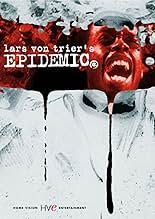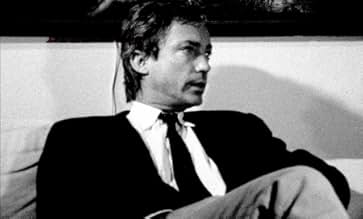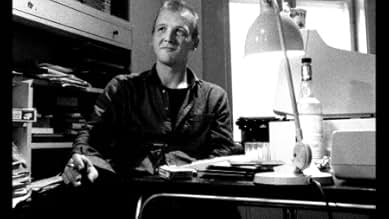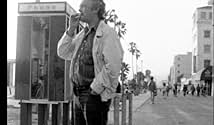IMDb RATING
5.9/10
6.6K
YOUR RATING
A director and screenwriter pen a script and, in the process, blur the line between fiction and reality.A director and screenwriter pen a script and, in the process, blur the line between fiction and reality.A director and screenwriter pen a script and, in the process, blur the line between fiction and reality.
- Awards
- 2 nominations total
- Director
- Writers
- All cast & crew
- Production, box office & more at IMDbPro
5.96.5K
1
2
3
4
5
6
7
8
9
10
Featured reviews
Dogma avant-la-lettre
EPIDEMIC (Lars von Trier - Demark 1987).
Von Trier's second feature reveals his obsessions with cinema, with his self-imposed limitations on film-making in many ways foreshadowing Von Trier's later obstructions upon Jorgen Leth in THE FIVE OBSTRUCTIONS (2003).
Essentially a film about his own obsessions, or a grand parody on horror, as some suggested. Von, Trier, frustrated by the delay of his never realized project, "The Grand Mal", about two gangster families in divided Berlin, made a bet with film consultant Claes Kastholm of the Danish Film Institute, claiming that he could make a feature film for one million Danish kroner. Resulting partly in an amateur movie about a film director and a scriptwriter who must write a new manuscript in five days, interspersed with scenes from the film they are working on - about a young idealistic doctor in the late 20th century, who tries to fight an epidemic, but only manages to spread it further. The film culminates with the outbreak of a deadly plague, not in the past but in the present. Throughout the film, Von Trier shows his fascination with Germany, for example, during a ride through the "Ruhrgebiet", the industrial core of Europe, or the world, at least during the '80s.
Camera Obscura --- 8/10
Von Trier's second feature reveals his obsessions with cinema, with his self-imposed limitations on film-making in many ways foreshadowing Von Trier's later obstructions upon Jorgen Leth in THE FIVE OBSTRUCTIONS (2003).
Essentially a film about his own obsessions, or a grand parody on horror, as some suggested. Von, Trier, frustrated by the delay of his never realized project, "The Grand Mal", about two gangster families in divided Berlin, made a bet with film consultant Claes Kastholm of the Danish Film Institute, claiming that he could make a feature film for one million Danish kroner. Resulting partly in an amateur movie about a film director and a scriptwriter who must write a new manuscript in five days, interspersed with scenes from the film they are working on - about a young idealistic doctor in the late 20th century, who tries to fight an epidemic, but only manages to spread it further. The film culminates with the outbreak of a deadly plague, not in the past but in the present. Throughout the film, Von Trier shows his fascination with Germany, for example, during a ride through the "Ruhrgebiet", the industrial core of Europe, or the world, at least during the '80s.
Camera Obscura --- 8/10
10ooeht
The man's a genius.
Of course, you gotta be a masochist to enjoy some people's genius - you know that if you bear with them they will take you to new levels of perception.
With Lars von Trier, the voyage is often hilarious. Epidemic is funny. Funny, in a Gummo kind of way: the characters are real, reality is eerie, and we laugh to break the tension; funny in a the characters say amusing things kind of way (preacher: "this bible is in goddamned Latin"); and funny in an Andy Kaufman screwing with the audience (yes, you) kind of way.
Make no mistake: you will suffer. If you are afraid, stay away from horror movies, ya pansy!
This movie also features some great aesthetic distance! It's bold!
With Lars von Trier, the voyage is often hilarious. Epidemic is funny. Funny, in a Gummo kind of way: the characters are real, reality is eerie, and we laugh to break the tension; funny in a the characters say amusing things kind of way (preacher: "this bible is in goddamned Latin"); and funny in an Andy Kaufman screwing with the audience (yes, you) kind of way.
Make no mistake: you will suffer. If you are afraid, stay away from horror movies, ya pansy!
This movie also features some great aesthetic distance! It's bold!
A movie about making movies
"Epidemic" is, at its heart of hearts, a movie about making movies. As such it challenges the relation between fiction and reality. The two are not statically established realms, self contained in their clearly contained functional domains but they are dynamically interacting at all levels and at all times. The result is a movie in which the narrative structure is dual and of a meandering nature, climaxing in what could be a merge between a programmed project that involves human intellectual intervention- the movie within the movie- and the outbreak of a natural phenomenon with its catastrophic consequences- the epidemic.
Styllistically, "Epidemic" is very much a Lars Trier movie and it shows. From the apparently disconnected flow of scenes to mix of gritty realism with allegory, the director imprints his very personal mark in all elements of "Epidemic". Its very structure attests to this and the imagery reflects it in a very overt manner. "Epidemic" seems to be a playing ground of sorts in which Lars von Trier experiments as much as possible and in trying different things creates a diverse mismatch of scenes that not always work completely well together although they create an atmosphere.
As the process of coalescence between "fiction" and "reality" (this reality being, of course, fictional in itself which adds another layer of complexity and challenges the very notion of the third and fourth walls) heightens the narrative frame shrinks from the stage that is Europe to a small room. The claustrophobia of the later phase of the movie bring the full impact of the plague to the viewer's attention via a limited sample of the population that permits a personal experience of it all.
Much like Bergman's "The Seventh Seal", the plague in question is to be read on many levels and very much like the Swedish director's movie, "Epidemic" is not for everyone. Those who find it interesting, however, may have a strangely riveting experience upon watching this clearly unconventional movie that pushes many borders even if does not do so in a completely coherent manner.
Styllistically, "Epidemic" is very much a Lars Trier movie and it shows. From the apparently disconnected flow of scenes to mix of gritty realism with allegory, the director imprints his very personal mark in all elements of "Epidemic". Its very structure attests to this and the imagery reflects it in a very overt manner. "Epidemic" seems to be a playing ground of sorts in which Lars von Trier experiments as much as possible and in trying different things creates a diverse mismatch of scenes that not always work completely well together although they create an atmosphere.
As the process of coalescence between "fiction" and "reality" (this reality being, of course, fictional in itself which adds another layer of complexity and challenges the very notion of the third and fourth walls) heightens the narrative frame shrinks from the stage that is Europe to a small room. The claustrophobia of the later phase of the movie bring the full impact of the plague to the viewer's attention via a limited sample of the population that permits a personal experience of it all.
Much like Bergman's "The Seventh Seal", the plague in question is to be read on many levels and very much like the Swedish director's movie, "Epidemic" is not for everyone. Those who find it interesting, however, may have a strangely riveting experience upon watching this clearly unconventional movie that pushes many borders even if does not do so in a completely coherent manner.
A provocative but uneven exploration of art and reality
Epidemic (1987), directed by Lars von Trier, is a meta-cinematic exploration of the blurred line between fiction and reality. The film follows a director and screenwriter who, while working on a script about a plague, find themselves caught up in a real-life epidemic, mirroring the events they are writing. This film is a challenging and unconventional piece of work, characteristic of von Trier's early style, marked by its fragmented narrative and philosophical underpinnings.
The performances are fittingly restrained, with Allan De Waal and Ole Ernst bringing a sense of detachment and intellectual depth to their characters, reflecting the film's thematic concerns. The film's low-budget aesthetic, with shaky handheld camerawork and raw sound design, serves to reinforce the sense of chaos and uncertainty that permeates the narrative. It's a deliberate stylistic choice that enhances the surreal, almost documentary-like atmosphere, but it may be off-putting to some viewers who prefer more polished filmmaking.
Von Trier's direction is methodical, and while the premise of the film offers intriguing possibilities, the execution can feel disjointed and unclear at times. The dialogue often veers into abstract territory, and the narrative structure is fragmented, leaving viewers to piece together the meaning behind the events. The film's slow pace, combined with its minimalistic style, can make it feel like a deliberately inaccessible work, challenging the audience's patience.
Epidemic is a film that operates on multiple levels, blending political, artistic, and existential commentary with a quasi-documentary style. While it offers some thought-provoking moments, it struggles to maintain coherence and impact over its runtime. It is best suited for those interested in avant-garde cinema or those looking to delve into the early works of Lars von Trier, but casual viewers may find it frustrating.
Rating: 6/10. A provocative, if uneven, exploration of the intersection between art, reality, and societal collapse.
The performances are fittingly restrained, with Allan De Waal and Ole Ernst bringing a sense of detachment and intellectual depth to their characters, reflecting the film's thematic concerns. The film's low-budget aesthetic, with shaky handheld camerawork and raw sound design, serves to reinforce the sense of chaos and uncertainty that permeates the narrative. It's a deliberate stylistic choice that enhances the surreal, almost documentary-like atmosphere, but it may be off-putting to some viewers who prefer more polished filmmaking.
Von Trier's direction is methodical, and while the premise of the film offers intriguing possibilities, the execution can feel disjointed and unclear at times. The dialogue often veers into abstract territory, and the narrative structure is fragmented, leaving viewers to piece together the meaning behind the events. The film's slow pace, combined with its minimalistic style, can make it feel like a deliberately inaccessible work, challenging the audience's patience.
Epidemic is a film that operates on multiple levels, blending political, artistic, and existential commentary with a quasi-documentary style. While it offers some thought-provoking moments, it struggles to maintain coherence and impact over its runtime. It is best suited for those interested in avant-garde cinema or those looking to delve into the early works of Lars von Trier, but casual viewers may find it frustrating.
Rating: 6/10. A provocative, if uneven, exploration of the intersection between art, reality, and societal collapse.
A ghost is haunting Europe
I like Von Trier's films and this one and "The Idiots" seem to me the ones in which he achieves through both the way they are shot and the plot in itself, a high quality of personal artistic expression.
Concentrating on "Epidemic", I think the contrast between the black and white parts and the "story" is intriguing and effective, visually disturbing and helping to create the symbolic meaning the viewer could take from this movie.
To me, beyond more evident interpretations about predestination, Dreyer-like bad and evil explanations, I believe Von Trier -with the help of, for instance, bleak houses, rundown sourroundings and disease- tries to tell us that the world we're living is infected by a growing disease, living its marks in EACH ONE OF US, making Europe in general a dull and heartless place to live, a world killing us very slowly and with it our soul, our sensibility and our ability to feel. Like the final song : "we all fall down".
Against the complacency and cynism of much of the cultural expression nowadays, I think Von Trier's work is an exemple. That is why I recommend "Epidemic" to IMDB users.
Concentrating on "Epidemic", I think the contrast between the black and white parts and the "story" is intriguing and effective, visually disturbing and helping to create the symbolic meaning the viewer could take from this movie.
To me, beyond more evident interpretations about predestination, Dreyer-like bad and evil explanations, I believe Von Trier -with the help of, for instance, bleak houses, rundown sourroundings and disease- tries to tell us that the world we're living is infected by a growing disease, living its marks in EACH ONE OF US, making Europe in general a dull and heartless place to live, a world killing us very slowly and with it our soul, our sensibility and our ability to feel. Like the final song : "we all fall down".
Against the complacency and cynism of much of the cultural expression nowadays, I think Von Trier's work is an exemple. That is why I recommend "Epidemic" to IMDB users.
Did you know
- Crazy creditsThe film's title appears in red letters in the upper left corner of the screen for the entire length of the film.
- ConnectionsFeatured in The Making of 'Europa' (1991)
- SoundtracksTannhäuser (The Overture)
Composed by Richard Wagner
- How long is Epidemic?Powered by Alexa
Details
Box office
- Gross worldwide
- $938
- Runtime
- 1h 46m(106 min)
- Color
- Sound mix
- Aspect ratio
- 1.66 : 1
Contribute to this page
Suggest an edit or add missing content






















